Temples in Bhutan, or “Lhakhangs,” are vital to the country’s spiritual and cultural identity. Bhutan, known as the Land of the Thunder Dragon, is celebrated for these sacred sites steeped in Buddhist tradition. Among the highlights of Thimphu and other regions, visiting these temples offers an immersive experience. Notable sites include the iconic Taktsang Monastery, perched dramatically on a cliff, and the ancient Kyichu Lhakhang, each providing a serene spiritual experience. These temples reflect Bhutan’s rich heritage and offer breathtaking views of the Himalayas, making them a must-visit for anyone exploring the country.
List Of Temples In Bhutan
Bhutan is home to many sacred temples, each offering a unique spiritual experience. Here are 10 notable temples in Bhutan:
1. Taktsang Monastery (Tiger’s Nest), Paro
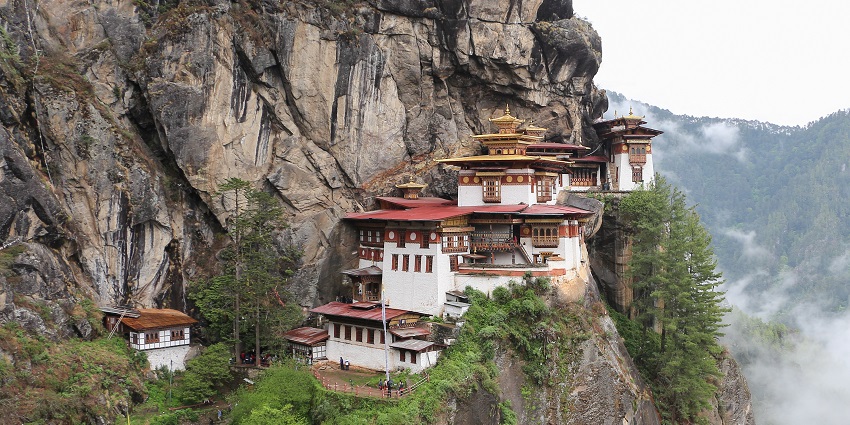
Photo: Bernard Gagnon / Wikimedia Commons
Taktsang Monastery, also known as Tiger’s Nest, is one of the famous temples in Bhutan, clinging to a cliff 3,120 metres above sea level. The temple complex was initially constructed in 1692 around the Taktsang Senge Samdup cave, where it is believed that Guru Padmasambhava meditated. The temple is a pilgrimage site revered across Bhutan and the Buddhist world. The hike to the monastery is a journey of spiritual reflection, offering spectacular views of the Paro Valley. The temple’s architecture, spiritual significance, and dramatic location make it one of Bhutan’s most cherished landmarks.
Location: Paro Valley, Bhutan
Timings: 8 AM – 1 PM, and 2 PM – 5 PM (visiting hours may vary)
Entry Fee: BTN 2,000 / INR 2,000
Suggested Read: Places To Visit In Paro
2. Kyichu Lhakhang, Paro
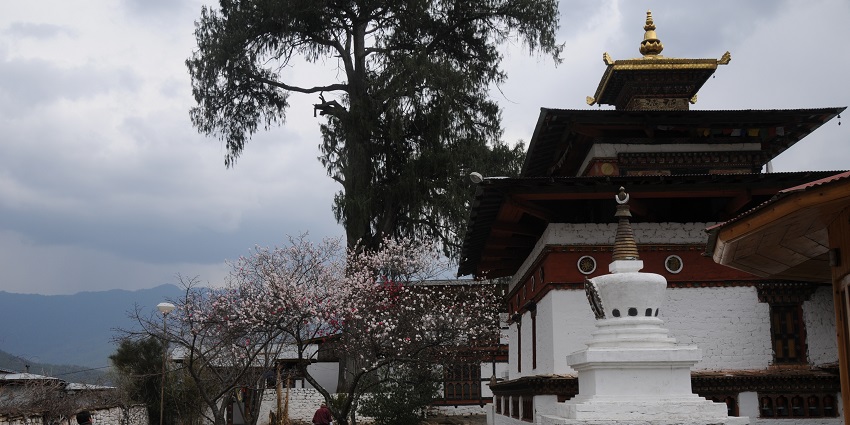
Photo: David Broad / Wikimedia Commons
Kyichu Lhakhang, located in the Paro Valley, is one of the famous temples in Bhutan, believed to have been built in the 7th century by the Tibetan King Songtsen Gampo. The temple is said to pin down the left foot of a giant ogress, symbolising the spread of Buddhism in the region. The temple’s interior houses beautiful statues of Guru Rinpoche and Tara, and the sacred orange tree in its courtyard is said to bear fruit throughout the year. The temple is a peaceful retreat for pilgrims and visitors, offering a glimpse into Bhutan’s ancient spiritual traditions.
Location: Paro Valley, Bhutan
Timings: 9 AM – 5 PM
Entry Fee: BTN 400 / INR 400
3. Punakha Dzong, Punakha
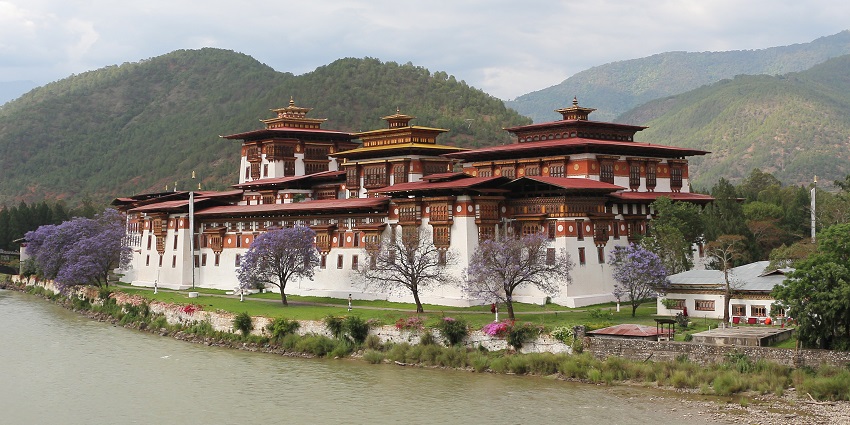
Photo: Bernard Gagnon / Wikimedia Commons
Punakha Dzong, also known as the “Palace of Great Happiness,” is one of the most important temples in Bhutan and historically significant dzongs (fortresses). Located at the confluence of the Pho Chhu and Mo Chhu rivers, this dzong served as the administrative centre and the seat of the Bhutanese government until the mid-20th century. The dzong is known for its stunning architecture, beautiful murals, and serene surroundings. It is also the site of the annual Punakha Tshechu festival, a vibrant celebration of Bhutanese culture and spirituality. Punakha Dzong remains a vital symbol of Bhutanese heritage.
Location: Punakha Valley, Bhutan
Timings: 9 AM – 5 PM
Entry Fee: BTN 800 / INR 800
Suggested Read: Top Places To Visit In Punakha
4. Chimi Lhakhang, Punakha
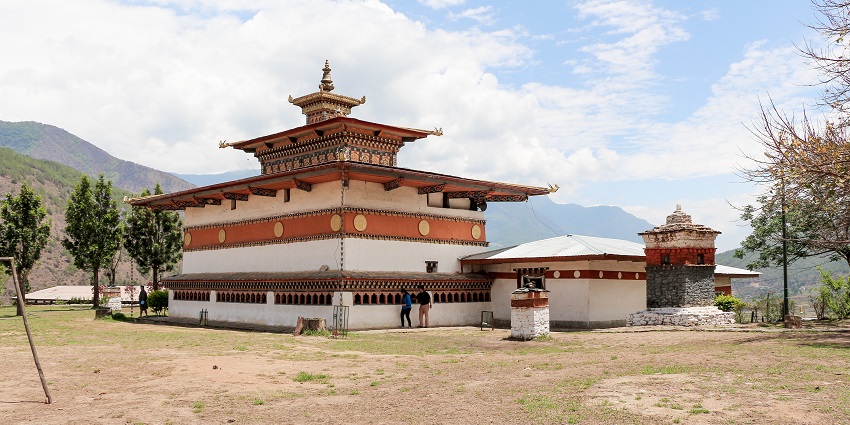
Photo: Bernard Gagnon / Wikimedia Commons
Chimi Lhakhang, situated on a hillock in Punakha, is one of the popular temples in Bhutan dedicated to Lama Drukpa Kunley, also known as the “Divine Madman.” The temple is widely known for its fertility blessings, and childless couples from all over the world visit Chimi Lhakhang to seek the blessings of the Divine Madman. The temple is also famous for its phallic symbols, believed to ward off evil spirits. The serene surroundings and the temple’s spiritual significance make it a popular destination for both locals and tourists, offering a unique insight into Bhutanese spiritual practices.
Location: Punakha Valley, Bhutan
Timings: 9 AM – 5 PM
Entry Fee: BTN 400 / INR 400
5. Dochula Pass And Druk Wangyal Lhakhang, Thimphu
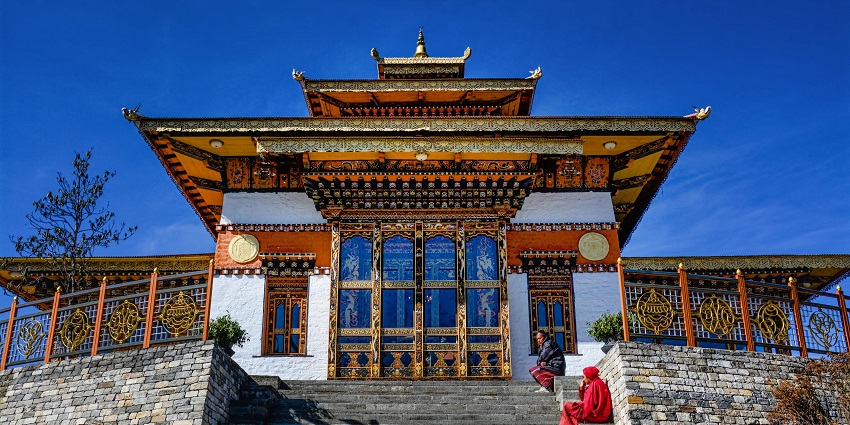
Photo: Dhruba Jyoti Baruah / Wikimedia Commons
Dochula Pass is one of Bhutan’s most scenic spots, offering breathtaking panoramic views of the snow-capped Himalayas. The pass is also home to the Druk Wangyal Lhakhang, a temple built in honour of the fourth King, Jigme Singye Wangchuck. The 108 chortens (stupas) at the pass are built in memory of Bhutanese soldiers who died in a military operation. The temple and the chortens stand as a symbol of Bhutan’s peace and stability. Visitors often stop at Dochula Pass to pay their respects and enjoy the stunning mountain views, making it a memorable spiritual and visual experience.
Location: Dochula Pass, Thimphu, Bhutan
Timings: 9 AM – 5 PM
Entry Fee: Free, but donations are appreciated
Suggested Read: Peaceful Places To Visit Near Thimphu That Reflect Bhutan’s Culture
6. Gangtey Monastery, Phobjikha Valley
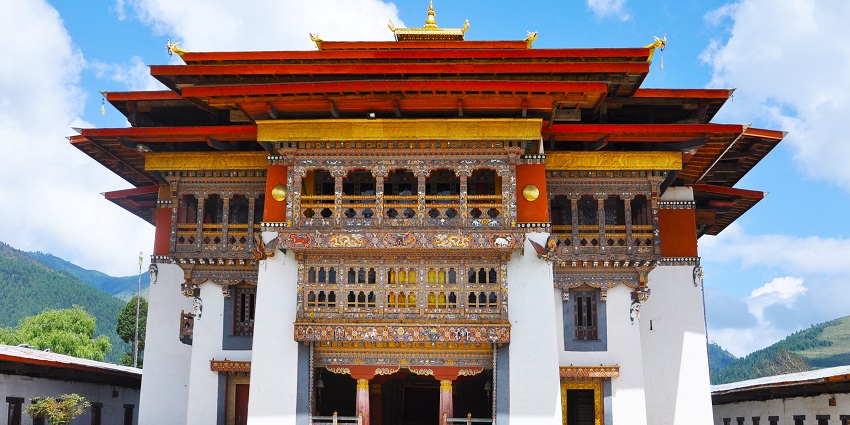
Photo: Prof Ranga Sai / Wikimedia Commons
Gangtey Monastery, also known as Gangtey Gonpa, is a prominent Nyingma monastery located in the beautiful Phobjikha Valley. Founded in the 17th century by Pema Lingpa’s descendants, the monastery is an important religious site and a hub of Nyingma spiritual practice. The monastery is surrounded by picturesque landscapes, and the valley is also the winter home of the endangered black-necked cranes, which migrate from Tibet. The annual Black-Necked Crane Festival, celebrated at the monastery, draws many visitors who come to witness the region’s unique cultural and natural heritage.
Location:Phobjikha Valley, Bhutan
Timings: 9 AM – 5 PM
Entry Fee: BTN 400 INR 400
7. Tango Monastery, Thimphu
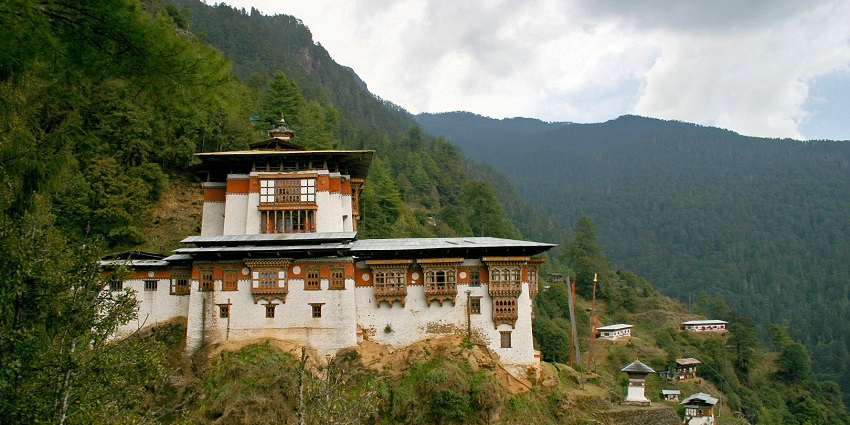
Photo: Jean-Marie Hullot / Wikimedia Commons
Tango Monastery, located north of Thimphu, is one of the most popular monasteries in Bhutan, serving as a Buddhist college where monks undergo rigorous training. The monastery was founded in the 12th century and later rebuilt by Shabdrung Ngawang Namgyal, the unifier of Bhutan, in the 17th century. The temple is known for its serene atmosphere and beautiful architecture, with intricate murals and carvings that reflect Bhutanese religious art. The hike to Tango Monastery through lush forests adds to the spiritual experience, making it a popular pilgrimage and meditation site.
Location: Near Thimphu, Bhutan
Timings: 8 AM – 5 PM
Entry Fee: BTN 400 INR 400
Suggested Read: Monasteries In Bhutan Among Its Scenic Vistas
8. Kurjey Lhakhang, Bumthang
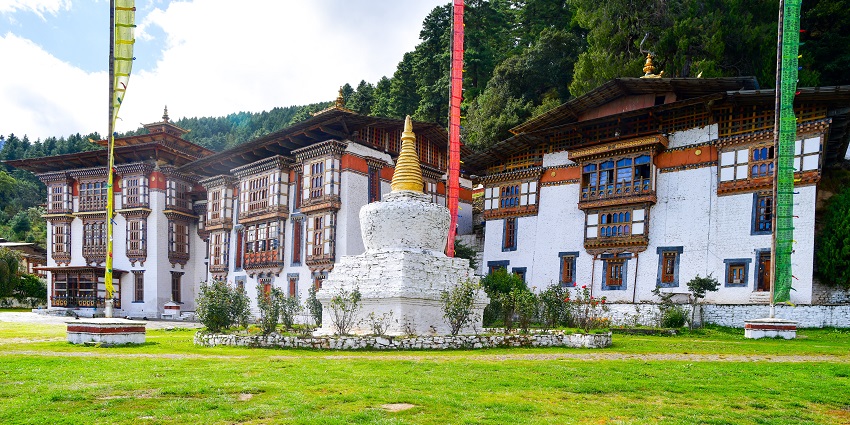
Photo: Christopher J. Fynn / Wikimedia Commons
Kurjey Lhakhang is one of Bhutan’s most sacred temples, located in the Bumthang Valley. The temple complex is named after the body imprint (kurjey) of Guru Rinpoche, which is believed to be embedded in a rock inside the oldest temple. The complex consists of three temples, each built in a different period, representing various aspects of Bhutanese spiritual heritage. The annual Kurjey Tshechu festival is held here and attracts pilgrims from all over Bhutan. The temple’s serene setting and spiritual significance make it a must-visit site in Bhutan.
Location: Bumthang Valley, Bhutan
Timings: 9 AM – 5 PM
Entry Fee: BTN 400 INR 400
9. Jambay Lhakhang, Bumthang
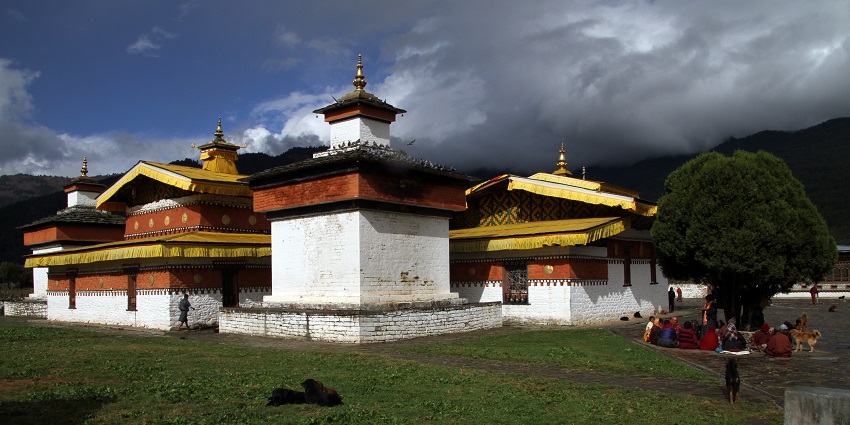
Photo: Gerd Eichmann / Wikimedia Commons
Jambay Lhakhang, located in the Bumthang Valley, is one of the oldest temples in Bhutan, built in the 7th century by Tibetan King Songtsen Gampo. The temple is part of the 108 temples the king built across the Himalayas to subdue a demoness threatening Buddhism. The temple is particularly famous for the Jambay Lhakhang Drup, an annual festival featuring colourful mask dances and rituals. The temple’s ancient architecture and spiritual atmosphere make it a significant pilgrimage site, offering a glimpse into Bhutan’s rich religious history.
Location: Bumthang Valley, Bhutan
Timings: 9 AM – 5 PM
Entry Fee: BTN 400 INR 400
Suggested Read: Discover The Top Things To Do In Bhutan
10. Lhuentse Dzong, Lhuentse
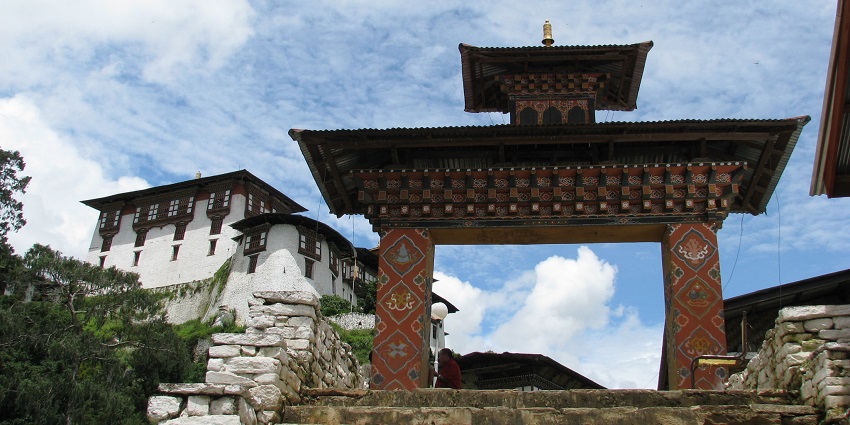
Photo: muddum27 / Wikimedia Commons
Lhuentse Dzong, also known as Lhundrup Rinchentse, is a majestic fortress located in the remote Lhuentse district of eastern Bhutan. The dzong is perched on a ridge overlooking the Kurichu River and is surrounded by rugged mountains. The dzong is not only a spiritual centre but also historically significant, as it is the ancestral home of Bhutan’s royal family. The annual Lhuentse Tshechu festival, held in the dzong’s courtyard, is a vibrant celebration of Bhutanese culture and spirituality. The dzong’s remote location adds to its mystique, offering visitors a unique and serene experience.
Location: Lhuentse District, Bhutan
Timings: 9 AM – 5 PM
Entry Fee: BTN 400 / INR 400
Exploring the temples in Bhutan offers a deep spiritual journey, connecting visitors to the country’s rich Buddhist heritage and serene landscapes. Each temple provides a unique experience of Bhutan’s cultural and religious essence. For those seeking to explore the spiritual heart of Bhutan, planning a trip with TripXL ensures a seamless and enriching journey, leaving visitors with lasting memories of this mystical Himalayan kingdom.
Cover Photo: Bernard Gagnon / Wikimedia Commons


 WhatsApp
WhatsApp
 Twitter
Twitter









